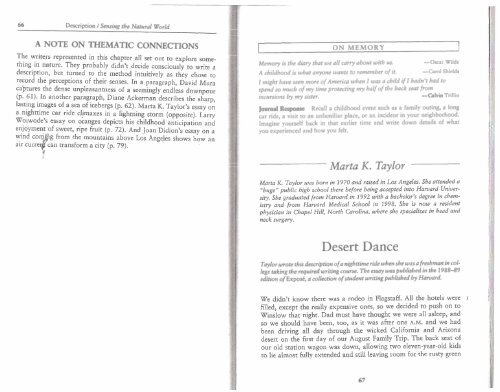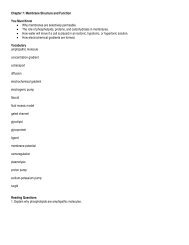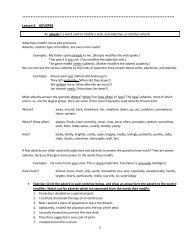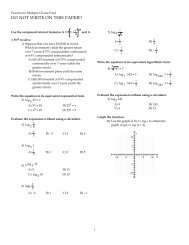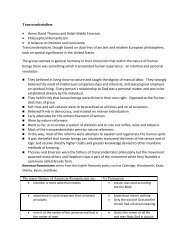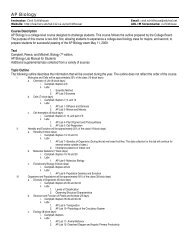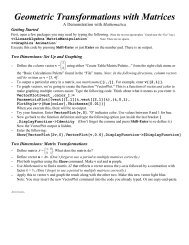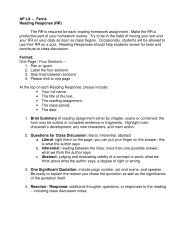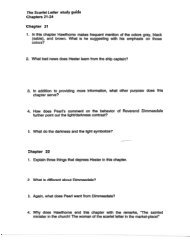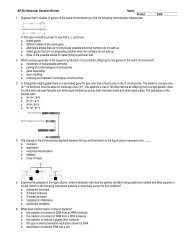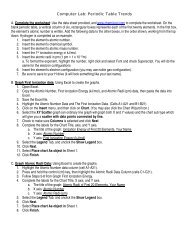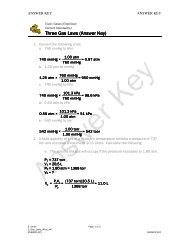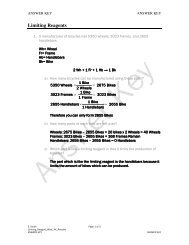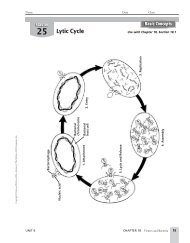Desert Dance - Teacher
Desert Dance - Teacher
Desert Dance - Teacher
You also want an ePaper? Increase the reach of your titles
YUMPU automatically turns print PDFs into web optimized ePapers that Google loves.
66 Description / Sensing the Natural World<br />
A NOTE ON THEMATIC CONNECTIONS<br />
The writers represented in this chapter all set out to explore some-<br />
thing in nature. They probably didn't decide consciously to write a<br />
description, but turned to the method intuitively as they chose to<br />
record the perceptions of their senses. In a paragraph, David Mura<br />
cabtures the dense unpleasantness of a seemingly endless downpour<br />
(p. 61). In another paragraph, Diane Ackerman describes the sharp,<br />
lasting images of a sea of icebergs (p. 62). Marta K. Taylor's essay on<br />
a nighttime car ride climaxes in a lightning storm (opposite). Larry<br />
Woiwode's essay on &ranges depicts his childhood anticipation and<br />
enjoyment of sweet, ripe fruit (p. 72). And Joan Didion's essay on a<br />
wind io+,@g from the mountains above Los Angeb shows how an<br />
air curre? can transform a city (p. 79).<br />
rl<br />
ON MEMORY<br />
Memory is the diary that we all carry about with us.<br />
-Oscar Wilde<br />
A childhood is what anyone wants to remember of it. -Carol Shields<br />
1 might have seq more of America when I was a child if 1 hadn't had to<br />
spend so much of my time protecting my half of the back seat from<br />
incursiolzs by my sister. -Calvin Trillin<br />
Journal Response Recall a childhood event such as a family outing, a long<br />
car ride, a visit to an unfamiliar place, or an incident in your neighborhood.<br />
Imagine yourself back in that earlier time and write down details of what<br />
you experienced and how you felt.<br />
Marta K. Taylor<br />
Marta K. Taylor was born in 1970 and raised in Los Angeles. She attended a<br />
"huge" public high school there before being accepted into Harvard Univer-<br />
sity. She graduated from Harvard in 1992 with a bachelor's degree in chem-<br />
istry and from Haward Medical School in 1998. She is now a resident<br />
physician in Chapel Hill, North Carolina, where she specializes in head and<br />
neck surgery.<br />
<strong>Desert</strong> <strong>Dance</strong><br />
Taylor wrote this description of a nighttime ride when she was a freshman in col-<br />
lege taking the required writing course. The essay was published in the 1988-89<br />
edition of Exposi, a collection of student writing published by Harvard.<br />
We didn't know there was a rodeo in Flagstaff. All the hotels were 1<br />
filled, except the really expensive ones, so we decided to push on to<br />
Winslow that night. Dad must have thought we were all asleep, and<br />
so we should have been, too, as it was after one A.M. and we had<br />
been driving all day through the wicked California and Arizona<br />
desert on the first day of our August Family Trip. The back seat of<br />
our old station wagon was down, allowing two eleven-year-old kids<br />
to lie almost fully extended and still leaving room for the rusty green
68 Description I Sensiqg the Natural World<br />
Coleman ice-chest which held the packages of pressed turkey breast,<br />
the white bread, and the pudding snack-pacs that Mom had cleverly<br />
packed to save on lunch expenses and quiet the inevitable "Are we<br />
there yet?" and "How much farther?"<br />
Jon was sprawled out on his back, one arm up and one arm down,<br />
rhinding me of Gumby or an outline chalked on the sidewalk in a<br />
marder mystery. His mouth was wide open and his regular breath<br />
rattled deeply in the back of his throat somewhere between his mouth<br />
and his nose. Beside the vibration of. the wheels and the steady hum of<br />
the engine, no other sound disturbed the sacred silence of the desert<br />
night.<br />
I lay, behind the driver's sear, next to my twin<br />
the old green patchwork quilt that smelled like beaches<br />
-salty and a little mildewed-I could see my mother's<br />
n head slumped against the side window, her neck bent<br />
against the seat belt, which seemed the only thing holding<br />
her in her seat. Dad, of course, drove-a motionless, soundless, pro-<br />
tective paragon of security and strength, making me feel totally safe.<br />
The back of his head had never seemed more perfectly framed than<br />
by the reflection of the dashboard lights on the windshield; the short,<br />
raven-colored wiry hairs that I loved so much caught and played<br />
with, like tinsel would, the greenish glow with red and orange ac-<br />
cents. The desert sky was starless, clouded.<br />
Every couple of minutes, a big rig would pass us going west. The<br />
lights would illuminate my mother's profile for a moment and then the<br />
roar of the truck would come and the sudden, the violent sucking rush<br />
of air and we would be plunged into darkness again. Time passed so<br />
slowly, unnoticeably, as if the whole concept of time were meaningless.<br />
I was careful to make no sound, content to watch the rising and<br />
falling of my twin's chest in the dim light and to feel on my cheek the<br />
gentle heat of the engine rising up through the floorboards. I lay mo-<br />
tionless for a long time before the low rumbling, a larger sound than<br />
any eighteen-wheeler, rolled across the open plain. I lifted my head,<br />
excited to catch a glimpse of the rain that I, as a child from Los Ange-<br />
les, seldom saw. A few seconds later, the lightning sliced the night sky<br />
all the way across the northern horizon. Like a rapidly growing twig,<br />
at least three or four branches, it illuminated the twisted forms of<br />
Joshua trees and low-growing cacti. All in silhouette-and only for a<br />
flash, though the image stayed many moments before my mind's eye<br />
ill the following black.<br />
Taylor I <strong>Desert</strong> <strong>Dance</strong> 69<br />
The lightning came again, this time only a formless flash, as if God<br />
were taking a photograph of the magnificent desert, and the long,<br />
straight road before us-empty and lonely-shone like a dagger. The<br />
trees looked like old men to me now, made motionless by the natural<br />
strobe, perhaps to resume their feeble hobble across the sands-once the<br />
shield of night returned. The light show continued on the horizon<br />
though the expected rain never came. The fleeting, gnarled fingers<br />
grasped out and were gone; the fireworks flashed and frolicked and<br />
faded over and over-danced and jumped, acting out a drama in the<br />
quick, jerky movements of a marionette. Still in silence, still in darkness.<br />
I watched the violent, gaudy display over the uninhabited, end-<br />
less expanse, knowing I was in a state of grace and not knowing if 1<br />
was dreaming but pretty sure I was awake because of the cramp in<br />
my neck and the pain in my elbow from placing too much weight on<br />
it for too long.<br />
Meaning<br />
1. What does Taylor mean by "state of grace" in paragraph 7? What associations<br />
does this phrase have? To what extent does it capture the dominant<br />
impression of this essay?<br />
2. If you do not know the meaning of any of the words below, try to guess<br />
it from its context in Taylor's essay. Test your guesses in a dictionary,<br />
and then try to use each word in a sentence or two of your own.<br />
paragon (3)<br />
silhouette (5)<br />
strobe (6)<br />
gnarled (6)<br />
frolicked (6)<br />
Purpose and Audience<br />
marionette (6)<br />
gaudy (7)<br />
1. Why does Taylor open with the sentence "We didn't linow there was a<br />
rodeo in Flagstaff"? What purposes does the sentence serve?<br />
2. Even readers familiar with the desert may not have had Taylor's experi-<br />
ence of it in a nighttime lighming storm. Where does she seem especially<br />
careful about describing what she saw? What details surprised you?<br />
Method and Structure<br />
1. What impression or mood is Taylor trying to capture in this essay? HOW<br />
does the precise detail of the description help to convey that mood?<br />
2. Taylor begins her description inside the car (paragraphs 1-5) and then<br />
moves out into the landscape (5-7), bringing us back into the car in her
70 Description 1 Sensing the Natural World<br />
final thought. Why does she use such a sequence? Why do you think she<br />
devotes about equal space to each area?<br />
3. Taylor's description is mainly subjective, invested with her emotions.<br />
Point to elements of the description that reveal emotion.<br />
4. Other Methods Taylor's description relies in part on narration (Chap-<br />
*;: ter 5). How does narrative strengthen the essay's dominant impression?<br />
'C<br />
1. How does Taylor's tone help convey the "state of grace" she feels inside<br />
the car? Point out three or four examples of language that establish that<br />
o you think Taylor titles her essay "<strong>Desert</strong> <strong>Dance</strong>"?<br />
the words Taylor uses to describe Joshua trees (paragraphs 5-6).<br />
re already familiar with the tree, how accurate do you find<br />
Taylor's description? If you've never seen a Joshua tree, what do you<br />
think it looks like, based on Taylor's description? (Next time you're in<br />
the library, look the tree up in an encyclopedia to test your impression.)<br />
4. Taylor uses similes to make her description vivid'and immediate. Find<br />
several examples, and comment on their effectiveness. (See p. 53 for<br />
more on similes.)<br />
5. Taylor's last paragraph is one long sentence. Does this long sentence<br />
work with or against the content and mood of the paragraph? Why and<br />
how?<br />
Writing Topics<br />
1. Journal to Essay Using subjective description, expand your journal<br />
entry about a childhood event (p. 67) into an essay. Recalling details of<br />
sight, sound, touch, smell, even taste, build a dominant impression for<br />
readers of what the experience was like for you.<br />
2. Taylor's essay illustrates her feelings not only about the desert but also<br />
about her father, mother, and twin brother. Think of a situation when<br />
you were intensely aware of your feelings about another person (friend<br />
or relative). Describe the situation and the person in a way that conveys<br />
those feelings.<br />
3. Cultural Considerations Though she had evidently seen the desert be-<br />
fore, Taylor had not seen it the way she describes it in "<strong>Desert</strong>,<strong>Dance</strong>."<br />
Write an essay in which you describe your first encounter with some-<br />
thing new-for instance, a visit to the home of a friend from a different<br />
social or economic background, a visit to a big city or a farm, an unex-<br />
1 Taylor/ <strong>Desert</strong> <strong>Dance</strong> 71<br />
I<br />
,<br />
pected view of your own backyard. Describe what you saw and your responses.<br />
How, it at all, did the experience change you?<br />
4. Connections Both Taylor and Diane Ackerman (in the paragraph on<br />
p. 62) experience awe at a natural wonder. In a brief essay, analyzs how<br />
these writers convey their sense of awe so that it is concrete, not vague.<br />
Focus on their words and especially on their figures of speech. (See<br />
pp. 53-54 for more on figures of speech.)


